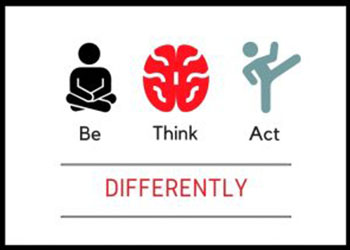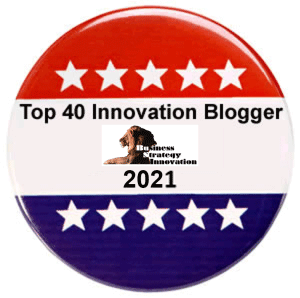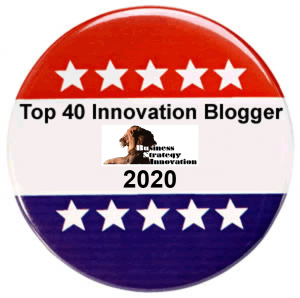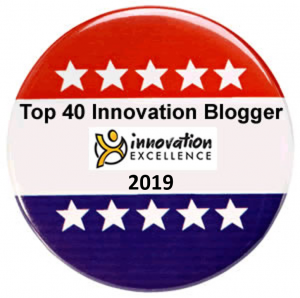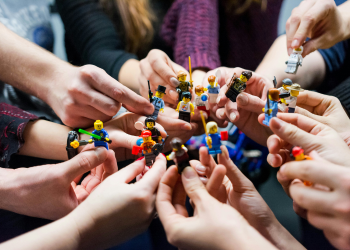When I relocated to Israel, in pursuit of a more meaningful life, I quickly discovered that I would be unable to find high-value work in my culture consulting, top team and leadership development areas of expertise. As a result of this experience, what occurred was a powerful and deep collision between the necessity to earn a living, and the range of possibilities I could see emerging from the creative, innovative and entrepreneurial environment I was living amidst. I quickly realized that to be successful it would serve me well to develop learning agility. To adapt and grow by embracing the disruptive, diverse and different culture existing in Israel, a nation which harnesses the collective genius of its people to successfully innovate at the edge of chaos.
Letting go to let come
This meant letting go of most of what I knew and practiced to adapt by learning completely new and different ways of being, thinking and acting in almost every area of my life. It also meant becoming open-minded and adopting a beginner’s mind, and a ‘not knowing’ mindset to create an empty space for new and deep learnings to emerge.
It was not an easy task, and over the six years living in Israel, I made zillions of mistakes, seriously failed, and faced heaps of adverse people and situations. I also encountered a number of serious, monumental brick walls. What supported me, were the eight major career and life changes I had already experienced and mastered. Also, the fact that I had invested a large part of my corporate life in continuously learning how to learn, and in learning how to teach others how to learn. This provided me with a deep foundation of core knowledge in the areas of transformational leadership, teams, achievement, and accountability.
Playing in the learning and development game
This meant that I was somewhat competent, had the capacity (and occasionally) the confidence, to play further in the learning and development game.
I did this intentionally, by working on being proactive, constructive and non-defensive (even though it was often very hard) by:
- Not slipping into blaming and shaming others (even though it was often very tempting) when things went astray.
- Seeing myself as personally responsible for becoming the best person I could be.
- Perceiving it all as a set of significant “learning experiences” that would serve me well in the future.
Little did I realize at the time, and only through pausing to retreat and reflect on my experiences, which enabled me to integrate and assimilate them, that I had become, in practice, what we now call, at ImagineNation™ an “agile learner.”
This is now the basis for our global innovation consulting, culture, leadership and coaching learning streams for harnessing people’s collective genius.
Developing learning agility
Sustaining success in today’s uncertain, unstable and highly competitive business environment is becoming increasingly dependent on people’s ability to deeply learn. Yet most people and a large number of organisations don’t seem to value learning as a performance improvement enabler. Nor do they know how people learn, never mind knowing how to develop the learning agility to potentially sustain them in VUCA times.
Four new categories of work
BCG in their “Twelve Forces That Will Radically Change How Organization Work Report” identified four key categories;
“The first two address changes in demand for talent; technological and digital productivity and shifts in the ways of generating business value. The second two address changes in the supply of talent; shifts in resource distribution and changing workforce culture and values”.
These forces are revolutionizing the notions of “talent,” and the way work gets done in companies. Compelling leaders to rethink and relearn “even the most basic assumptions about how their organizations function”.
Being, thinking and acting differently
To survive, compete and flourish with the exponential changes, it is crucial to improve people’s confidence, capacity, and competence in learning agile ways of being, thinking and acting differently.
This enables them to be agile because they have developed an ability to make intentional shifts in changing contexts, to respond effectively and creatively, to both the unexpected and unplanned, in big and small ways.
Benefits of learning agility
When we know how to embrace, adapt and continuously improve ourselves (and others we impact and interact with) through learning, we are able to create, invent and innovate real business breakthroughs. We can really make a difference, in ways that are meaningful and add value to the quality of people’s lives. In the case of customers, when we know how to learn to continuously create, invent and deliver new products and services, it results in “greater user experiences.”
Harnessing collective genius
In the case of Talent, when we know how to learn how to make work more meaningful, connected and purposeful, we can better energize, catalyze, mobilize, maximize and harness their collective genius. Resulting in a more creative, engaged and empowered high-performance workplace.
Improving organisational agility
In the case of organisations, we can learn how to learn to increase revenue-generating products and services and to generate greater customer satisfaction (and advocacy). Organizations benefit by increasing their speed to market and the number of innovative projects that get delivered. Also by improving operational efficiencies through developing innovative cultures and business eco-systems to collaborate and harness Talent’s collective genius.
Cultivating innovation agility
At ImagineNation™ we know that the corporate learning and development market is being seriously disrupted. Seeing this as a catalyst for re-inventing the corporate learning paradigm, we developed, tested, failed, learnt and adapted our competence, capacity and confidence to innovate, an agile menu of innovative learning pathways.
Where connecting happens through an implicit shared intention and experience and intention. Where learning happens through play, experimentation and emergence, which enables people to see their worlds with fresh eyes, and co-create new ways of being, thinking and acting.
This enables Talent to:
- Discover, explore and generate simple ways of working and flowing with, complex adaptive systems.
- Passionately and purposely create value by transforming business and user generative problems into innovative solutions.
- Creatively, courageously, compassionately and collaboratively respond to the unexpected.
- Give, take, and get permission to fail (with forgiveness) and learn by improvising, experimenting & doing.
- Provocate, punctuate and disrupt the status quo and experiment with unconventional methods to get work done.
This enables organizations to use their resources creatively and effectively, sometimes at a moment’s notice in response to the unexpected.
It also prioritizes ways of being, thinking, and acting which creates the permission and safe space for people to move, reflect and respond authentically and effectively.
Developing the four “E”s of Learning at work
If you are seeking to develop both innovation and learning agility it is important to incorporate the “Four E’s of Learning” at Work – Education, Experience, Environment, and Exposure.
This involves supporting people to learn at work to continuously upgrade their talent; “both” their knowledge, skills, experience “and” their motivation, and mindsets.
This is achieved by integrating technology and blending learning solutions that enable:
- Digital learning.
- Playful and experiential learning.
- Customized blended learning programs.
- Self-paced and team-based 24/7 learning.
In other words, making learning agile, available and accessible to everybody, at every time, across every modality and technology where people have the time to:
- Learn and feel that their new skills are valued.
- Retreat, reflect and explore and discover new ways of being, thinking and doing.
- Question, challenge the status quo and experiment with new ideas, fail without punishment, make and learn from mistakes.
Develop macro and microlearning agile customized learning solutions
It is important to design and develop learning programs that facilitate both micro and macro learning processes to develop people’s competence, capacity, and confidence to adapt and innovate in changing contexts.
Macro learning involves learning a whole new domain, where people need to continuously inject new skills, information, moods, and mindsets, behaviors and connections to;
- Move and speed up their learning curve until they become experts at innovation so that they can teach and coach others.
- Create space for learning “on the job skills” through practice, repetition, and continuous questioning about why something didn’t work.
Microlearning involves what we can quickly learn, view or consume in short periods of time. At ImagineNation™, we cluster microlearning activities to create customized agile macro learning blended learning programs for our clients.
Creating new agile learning pathways
The following diagram illustrates our approach, that disrupts corporate learning, by putting “The Agile Learner” at the centre. By then offering a range of micro options that can be patterned into a macro customized blended learning structure. This meets our clients learning needs in terms of subject or topic depth and breadth, as well as suits all learning styles, time, and technology and cost needs.
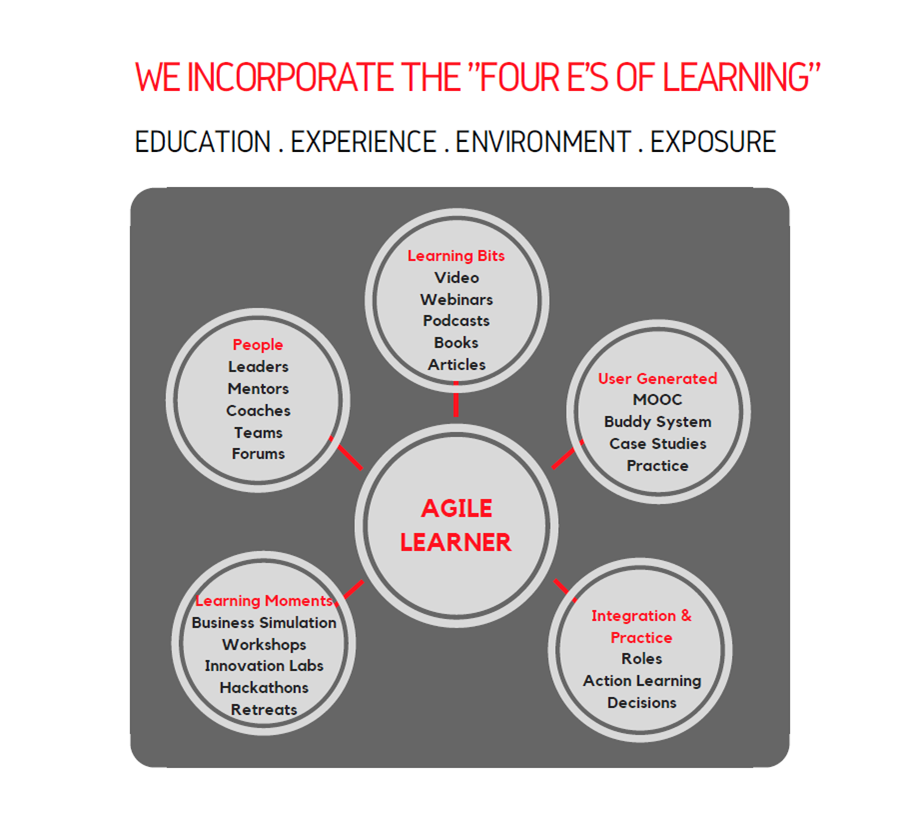 Flourishing in the new world of work
Flourishing in the new world of work
In the report Josh Bersin “The Disruption of Digital Learning: Ten Things we have learned” reveals that employees are feeling “overwhelmed” and in reality, only have “24 minutes a day to learn”.
If we want to seriously achieve 21st-century success and organisational sustainability, then we have to work harder at making learning and people matter.
We can do this strategically, systemically and in intentional, meaningful and purposeful ways, through adapting more creative, innovative micro and macro, blended and agile learning pathways.
This will energize, catalyze, harness and mobilize people’s collective genius.
He suggests that what really matters is your culture, your people’s career successes, and coaching. In ways where people feel safe, empowered and have permission to participate in on the job experiential learning. Where they can learn from mistakes; supported by effective performance data and rewards systems within a culture of learning. So that organisations have re-tooled Talent to win in the next decade.
At ImagineNation™ we provide innovation coaching, education and culture consulting to help businesses achieve their innovation goals. Because we have done most of the learning and actioning of new hybrid mindsets, behaviours and skill-sets already, we can help your businesses also do this by opening people up to their innovation potential.
Contact us now at janet@imaginenation.com.au to find out how we can partner with you to learn, adapt and grow your business in the digital age.
